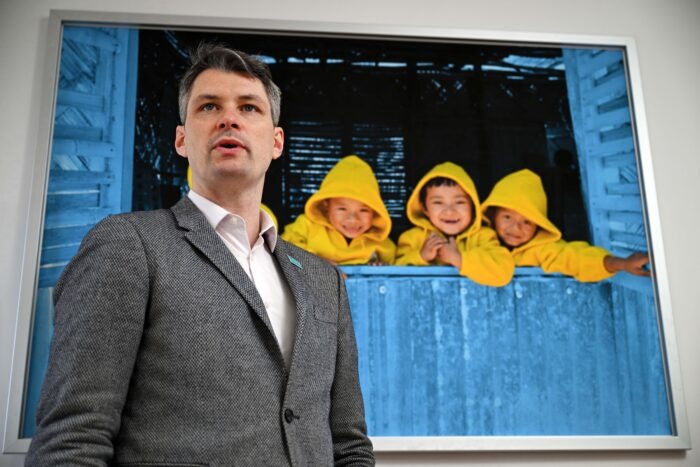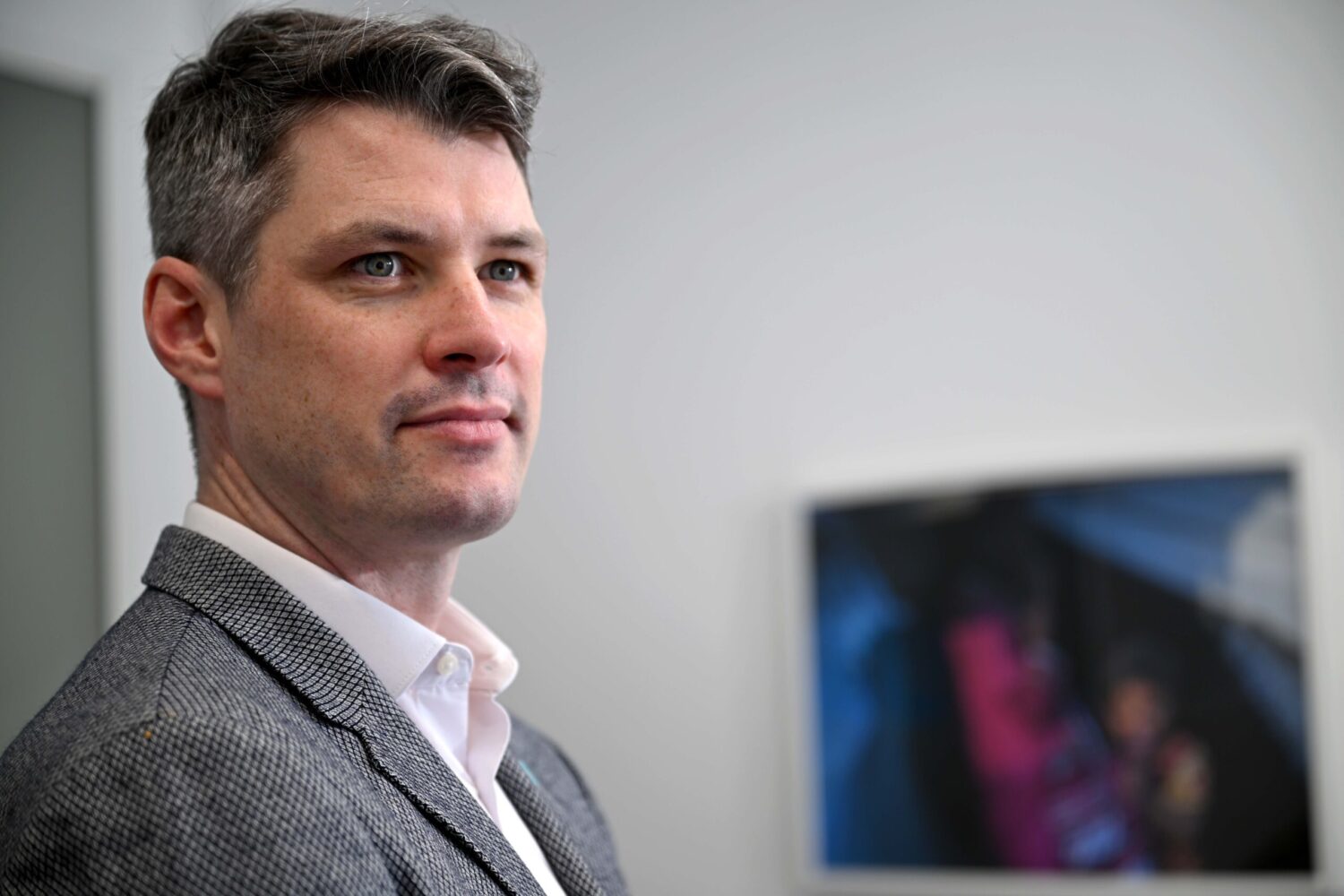Owen Buckley began his career as a high school teacher on the East Coast of the US.
Today, he is Head of Corporate Partnerships with UNICEF Ireland.
For most people, it might seem like a massive career pivot. For Buckley, however, it makes sense.
He got into teaching out of a sense of social justice. He had a happy childhood; there were days when he liked school and days when he did not. But, he realised that not everyone had those good days to counteract the bad ones.
After college, he took a job as a teacher in New York. There, he taught ethnically diverse students in an area where the poverty rates exceeded 75 per cent, and where most of the students were on free meal plans.
He liked the mission, but not the job. So, he moved on, working first for the Brooklyn Hospital Foundation and later, in Dublin, for Cystic Fibrosis Ireland – the move to Ireland was not entirely unexpected as his family had strong Irish roots and he had holidayed here consistently over the years.
This role, ultimately, led him to UNICEF Ireland, where he now works as Head of Corporate Partnerships.
“Classroom teaching wasn’t for me and I was more focused on trying to become an administrator,” he said
“I thought, ‘This is not a good indication for a teacher’. I knew I should jump ship.”
In his current role, however, Buckley is also having an impact, although he is quick to deflect attention; in our interview, he is keen to stress the work of his team and the people on the ground.
“I consider myself so lucky to be part of the UNICEF team, working alongside the real heroes of our time whose commitment to children’s rights is truly inspiring,” he said.
“We have colleagues working in 190 countries across the world who are saving children’s lives every day in the face of overwhelming odds, applying their skills and expertise to deliver the best results for children caught in emergencies – from natural to man-made disasters.”
But that work requires money, and Buckley is one of the many UNICEF staffers tasked with bringing in donations.
Buckley’s role is to bring companies on board as partners with UNICEF, and crucially, to make sure UNICEF and the partner are thoroughly aligned.
He cites a partnership with CRH. Earlier this year, the publicly listed building materials solutions business announced a new five-year, $15 million partnership with UNICEF to support vaccine delivery in fragile and conflict-affected countries.

The partnership will help to protect over 1.2 million vulnerable children from life-threatening diseases by improving their access to vaccines. According to UNICEF, it will help them “survive, thrive and reach their full potential”.
“It will also have a positive impact on millions more, who will benefit from improved immunisation services, an increase in well-trained health workers and vaccine education programmes – creating a lasting and sustainable impact in communities,” according to a joint statement from CRH and UNICEF.
The partnership was a long time in the works, but according to Buckley, it will have a long-term impact.
“As well as supporting UNICEF’s vaccine procurement and delivery programmes in fragile and conflict-affected countries, the partnership will also focus on increasing demand for immunisation in under-vaccinated communities, with a specific focus on countries in Europe and Central Asia,” he said.
“By working together, combining this big idea and bold commitment from CRH with UNICEF’s expertise in the immunization space, this partnership will deliver sustainable impact at scale that will resonate for generations to come.”
This is just one example. ESW, the Irish-founded e-commerce giant has been an ongoing supporter of UNICEF’s emergency responses, beginning with the delivery of Covid-19 vaccines, and through its emergency responses in Ukraine and Türkiye-Syria.
Primark has been a global partner of UNICEF since 2018, supporting education and promoting inclusive learning for children, as well as supporting UNICEF’s emergency responses in Ukraine, Türkiye and Syria.
The list goes on. And if Buckley has his way, it will grow longer still.
Dividends in a world of polycrisis
The way Owen Buckley sees it, forging a strong partnership with an NGO or charity can drive impact at scale for businesses. Plus, it is underpinned by a sense of higher purpose which can ripple through a business.
“It can trigger dividends across revenue, new business, recruitment, employee engagement and inclusion,” according to Buckley.
This is the message Buckey seeks to explain when he sits down with existing partners and potential UNICEF partners.
Working with UNICEF, he says, marries “unique perspectives, expertise and skillsets, with the result being far greater than the sum of its parts, changing the world for good”.
This is particularly true at present, as the world grapples with multiple humanitarian crises. “UNICEF’s mantra is to be there for children before, during and after emergencies,” he said. “However, it’s often the before and after that are the hardest to fund.
“In a world of polycrisis, grappling with more emergencies than ever before from war and conflict to climate-related disasters, preparing vulnerable communities in the ‘before’ and supporting them to rebuild and prosper ‘after’ is increasingly important.
“Often, at the outset of a partnership, a business will approach us looking to help ‘during’ an emergency. They and their teams are compelled by the shocking imagery they’ve seen on the news and want to do what they can to help.”
Buckley said that UNICEF has a global expertise in servicing partnerships, working with a wide variety of partners across the world at both a national and global level.
“We have local staff that are working on it and then we also have the coordinating centre within Geneva, so you’re bringing in best practice from across markets, best practice from across sectors, or even sector-specific in terms of how partnerships can be shaped,” he said.
Buckley said that UNICEF works with its partners in multiple ways – from supporting individual projects to broader support.
“Seeing proposals and big ideas come to life and make a real difference is like no feeling on earth and it drives me every day to do more,” Buckley said.
“Irish businesses and their people are among the most talented and creative professionals in the world – there’s a reason why so many global organisations have positioned their HQs here.”
He said his next big ambition was to “co-create a partnership where we bring in the technical expertise of a company to solve problems UNICEF is working on across health, nutrition, climate resilience, education and more”.
He said SDG (Sustainable Development Goals), ESG (Environmental, social and governance) and CSRD (Corporate Sustainability Reporting Directive) obligations are continuing to grow in prominence for businesses across the world and ambitious climate targets will only propel their importance.
“As a UN agency, UNICEF has a direct link to the SDGs and the Convention on the Right of the Child alongside ample experience supporting businesses to collaborate on projects underpinned by them,” he said.
According to Buckley, the nature of UNICEF’s partnerships varies, evolving to respond to children’s needs and changes in the business environment.
“Whether it is through strategic programmatic funding, by leveraging a company’s core expertise and networks, or by working with industries to promote child-rights principles in responsible business practices, we partner with the private sector to make a transformational difference for children.”
For more information, see UNICEF.ie.


